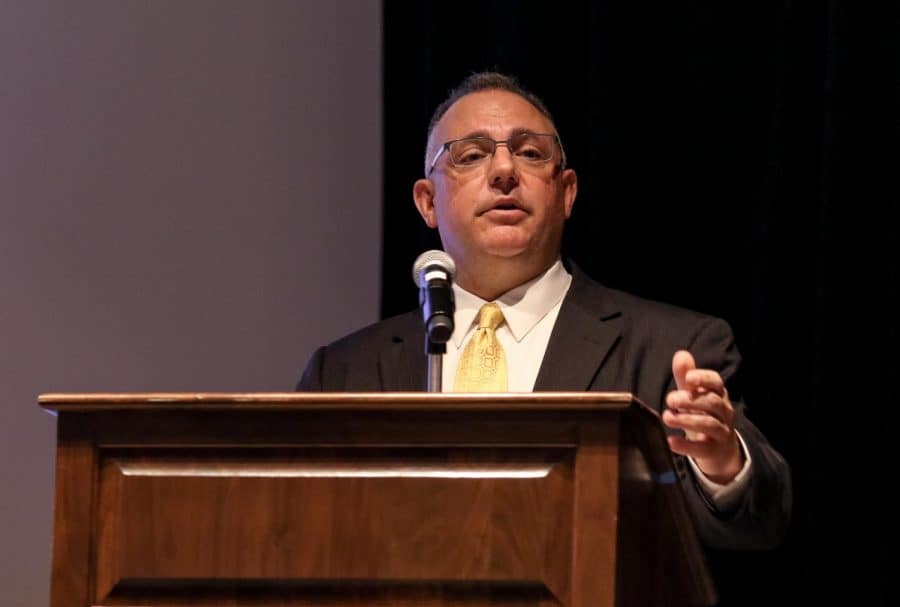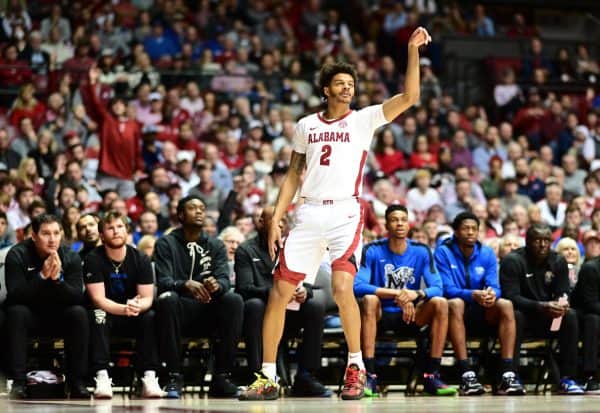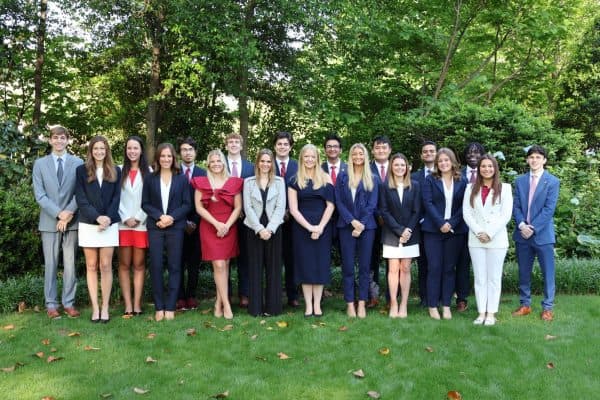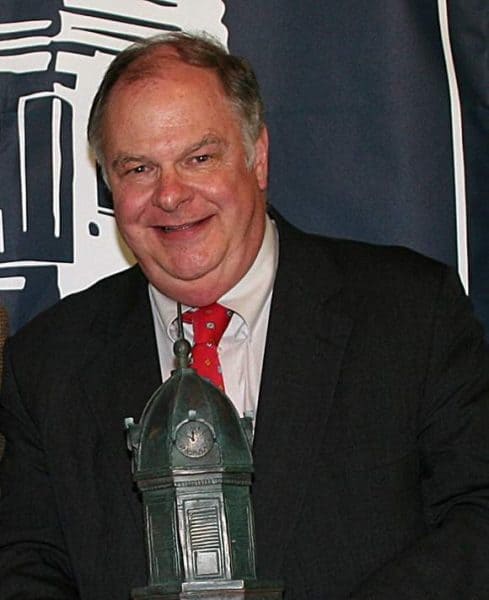CANDIDATE RECAP: Carilli addresses track record, diversity at VPSL forum
January 14, 2020
Questions about diversity and inclusion were at the forefront in the first of five candidate presentations for an open senior leadership position at the University of Alabama.
Vincent Carilli is the first of five candidates vying for the vice president for student life (VPSL) position to present to the public. The position opened up in late July, when the former VPSL, David Grady, resigned. An 11-member committee, announced in late September, narrowed down the search to five candidates, who will each present at the Ferguson Center Theatre over the next two weeks.
About 100 students and faculty attended the first forum, where Carilli took the stage to lay out his leadership philosophy and his vision of an evolving role in student life.
Carilli’s educational background includes small public universities, with the exception of a private Jesuit college, which he said he attended to “diversify his experience” in higher education. Carilli noted that, as a first-generation student on a Pell grant, higher education was a gift.
“I wear that badge proudly, as a person who tried to figure it out along the way,” he said.
Carilli resigned last month from his dual role as the interim vice chancellor of communications and vice chancellor for student life at the University of Tennessee, a position that he has held since 2014, where he managed an $80 million operating budget. Carilli, a Theta Chi, has worked in student affairs for over 30 years, beginning as an advisor for IFC and panhellenic councils.
For Carilli, the evolving role of student life can be encapsulated by 13 key areas: diversity, recruitment, retention, data analysis, educational efforts regarding social media usage, career readiness, student health and well-being, creating “civil discourse,” expanded fundraising, sustainability and impact, financial wellness, resource management and open educational resources.
Carrilli’s definition of diversity encompassed several areas, spanning from racial and ethnic diversity to non-traditional students, international students, gender expression and identity, first generation students, veterans, Pell eligible students, students with physical or emotional disabilities and online or part-time students.
In the public forum, several questions about diversity and inclusion were raised. A graduate student in housing asked about specific ways that Carilli has supported diverse students, to which Carilli responded that the most important thing leaders could do was to “be visible on campus.” Other questions about diversity included its specific role in student life and Carilli’s ideas on “culture-changing” as a solution for retaining diverse faculty and staff.
Carilli proposed more on-boarding measures for new faculty, the creation of mentors, and he drew on a DEI speaker series instituted at his university as a model for other professional development opportunities.
TRACK RECORD
Carilli’s track record at The University of Tennessee (UTK), however, prompted questions about a genuine commitment to diversity and inclusion.
In a video taken during a UTK protest, Austin Smith, then a senior at The University of Tennessee and a former SGA senator, expressed concerns about Carilli’s tenure at his alma mater.
https://twitter.com/nurse_aussie_/status/1207002822908268544?s=12
“Vincent Carilli is no one’s friend,” Smith said, his bullhorn pointed toward a cheering crowd. “He has been here for years and has given us the same backhand every single year when it comes to student programming, when it comes to misogyny, when it comes to racism, when it comes to anything that involves bigotry. Vincent Carilli is not the cure; he is the cause.”
The speech was referencing several incidents of racism and sexism on campus, such as a viral photo of students in blackface and a legislative move to divert student organization funding in the wake of controversy surrounding SEAT, a student group promoting sexual education and advocacy. In both incidents, Carilli faced criticism for failing to take adequate action.
[READ MORE: UT Knoxville blackface incident calls into question administrator, commitment to diversity]
In response to a question about moving the campus forward after the blackface incident last March, Carilli said accountability is key.
“For some of our leaders at The University [of Tennessee], they were a little paralyzed, so they opted to say nothing,” Carilli said to the audience. “I think that’s a pretty big mistake.”
He noted that this incident was a “turning point” and recalled that administrators had held several conversations with concerned students, but did not mention any specific policy or structural changes as outcomes. When pressed about why he didn’t expel the students involved, Carilli cited the first amendment.
“That was not a decision that was made casually,” he said, noting that he employed lawyers to advise him.
Carilli also expanded on the struggles that came with working at a university partially funded by the Tennessee legislature. The blackface incident came a year after a student group distributing sexual education programming prompted a legislative frenzy over funding. The resulting Student Programming Allocation Committee was ultimately created, at the behest of the legislature, as a way to create options for students who may not want their dollars going to “controversial” groups.
The move was met with backlash from several concerned students, one of whom took her grievances to Carilli. According to articles published in the student newspaper, Carilli told the student that her response was “unbecoming” and her language “bombastic.”
[READ MORE: Vice chancellor holds closed meeting on SPAC, student shares information on Twitter, Reallocation creates travel fund, affects student programming]
Smith also provided The Crimson White with other documents detailing private meetings and other encounters with Carilli in response to the funding split, including a Senate resolution addressing the language of the email. You can view each of those documents below:
- The Daily Beacon Interview
- Initial Statement on SPAC
- Emails
- Senate Resolution
- Resignation Letter
- The Hills We Died On
At the UA candidate forum, when asked about the funding split and how Carilli balanced student concerns with pressure from the state, Carilli reiterated the first amendment rights of students but doubled down on the specificity of the sex-ed programming in question.
“In order to provide that education, they have not utilized the most reputable resources,” he said, noting that the club had invited sex workers, which he called “porn stars,” into classrooms rather than “professionals” certified to teach a sexual education curriculum.
He said many felt the club had “harmed the university,” as the ordeal garnered the attention of evangelist Franklin Graham, who incited a media frenzy.
Gabriela Szymanowska, Editor-in-Chief of UTK’s The Daily Beacon, told The Crimson White that Carilli was working hard on new programming after the funding split.
“Vince was really, really supportive of student life here on campus,” she said, pointing to other key developments during his tenure, such as a new student code of conduct.
In closing, Carilli noted that free speech can be a double-edged sword, but was ultimately a value at his university.
“The university has taken the position that our students have first amendment rights, and the students are going to support those rights,” he said.
You can view a livestream of the talk here. Carilli’s CV and an evaluation form are available on ua.edu/vpsl through your MyBama login until the end of the day on Wednesday. Candidate information and feedback forms open the day before each presentation and close the day after. The next candidate will present at the Ferguson Center Theatre on Thursday, Jan. 16 from 11 a.m. to 12:30 p.m.
Stay tuned for continued coverage of this search process.
Editor’s Note, Jan. 17: A previous version of this story incorrectly paraphrased a quote from Szymanowska stating that Carilli was key to the creation of an LGBTQIA+ center on UTK’s campus. Szymanowska clarified that while Carilli oversaw the center, he did not create it.
The Pride Center was another program affected by legislative defunding, which occurred during Carilli’s tenure.











